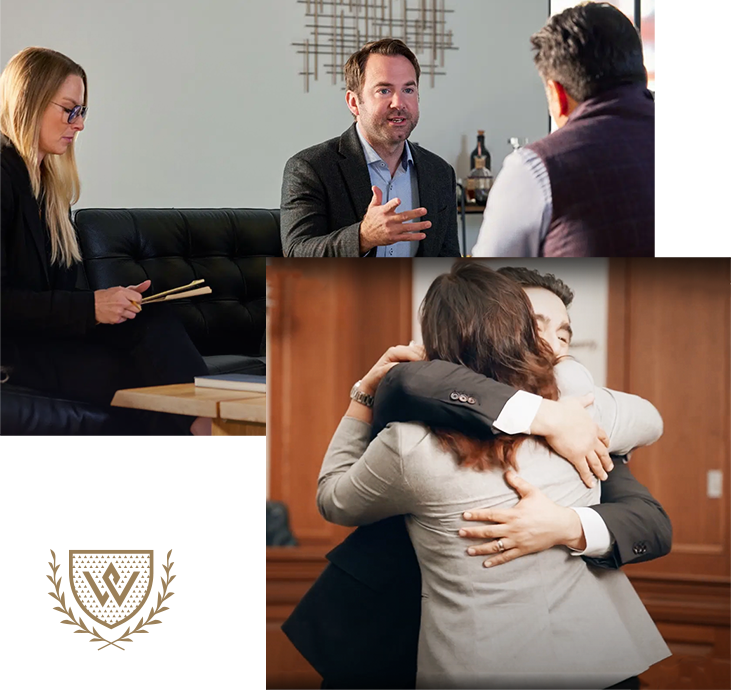
-
 Step 1: The ArrestDon’t let the police take advantage of you while you’re in custody. Call Walsh Law right away, and we’ll get to work protecting your rights so you don’t inadvertently self-incriminate.
Step 1: The ArrestDon’t let the police take advantage of you while you’re in custody. Call Walsh Law right away, and we’ll get to work protecting your rights so you don’t inadvertently self-incriminate. -
 Step 2: The ArraignmentWalsh Law is an aggressive Folsom criminal defense firm that can argue for reasonable bail and help you await the end of your case from the comfort of your home.
Step 2: The ArraignmentWalsh Law is an aggressive Folsom criminal defense firm that can argue for reasonable bail and help you await the end of your case from the comfort of your home. -
 Step 3: Pre-Trial HearingsWe’ll evaluate the prosecution’s case, challenge weak evidence and inconsistencies, and do our due diligence to get the charges against you reduced or dropped.
Step 3: Pre-Trial HearingsWe’ll evaluate the prosecution’s case, challenge weak evidence and inconsistencies, and do our due diligence to get the charges against you reduced or dropped.
Folsom Domestic Violence Defense Lawyers
Aggressively Defending the Accused in Greater Sacramento
While being accused of any crime can be daunting, facing domestic violence allegations can be especially challenging. Domestic violence is taken very seriously in California, and it isn’t uncommon for defendants to face multiple charges after a single incident. Whether you were falsely accused or simply weren’t thinking, our firm can fight for the second chance you deserve by providing an aggressive defense.
At Walsh Law, we understand how frightening and confusing it can be to face domestic violence charges. That’s why our domestic violence defense lawyers are committed to safeguarding your rights in Folsom. With our strong trial background and a winning track record of results in criminal defense cases, our litigators can collaborate closely with you to establish a robust defense. From challenging inadmissible evidence to negotiating plea deals, we can work tirelessly to protect your future and freedom.
Accused of domestic abuse in Folsom? Call (916) 610-3558 to schedule a free consultation with our experienced domestic violence defense lawyers.
Understanding Domestic Violence Laws in CA
Domestic violence, also known as domestic abuse, refers to a pattern of behavior that involves the use of physical force or intimidation to control another person, such as physical, emotional, sexual, or economic abuse. It occurs when someone commits abuse against a “domestic partner, such as a current or former spouse, cohabitant, co-parent, or a person the defendant is dating or previously dated.” Abuse is defined as intentionally or recklessly causing or attempting to cause bodily injury, or placing another person in reasonable apprehension of imminent serious bodily injury to themselves or another person.
Which Relationships Are Subject to Domestic Violence Laws?
Under state law, domestic violence only applies when the offense is committed against a domestic or intimate partner, including:
- The parent of your child
- A current or former spouse
- A person who lives with or has lived with you
- A person engaged or formerly engaged to you
- Anyone who is dating or sexually intimate with you
Is Domestic Violence a Felony in California?
Domestic violence is a wobbler offense, meaning it can be charged as a misdemeanor or a felony depending on the unique circumstances of the case. Some potential influencing factors include the severity of the injuries, any prior domestic violence convictions on the defendant’s record, and whether a deadly weapon was used during the incident.
A felony conviction for domestic violence can result in harsh consequences, including imprisonment and hefty fines. Regardless of the specific charges against you, it’s important to understand that a domestic violence conviction can inflict long-lasting impacts on your life. Securing a strong defense is critical to avoiding significant penalties and restoring your freedom.
Common Types of Domestic Violence Offenses
Under state law, various crimes fall under the umbrella of domestic violence. Common offenses include:
- Domestic battery: This is a misdemeanor offense codified in Penal Code §243(e)(1). Domestic battery is defined as using force or violence against a cohabitant, co-parent, or current or former spouse, fiancé, or dating partner. Offenders can still be convicted even if they didn’t injure the victim.
- Inflicting corporal injury on an intimate partner: Under Penal Code §273.5, this is a felony offense that occurs when an offender causes physical injury to a spouse, cohabitant, dating partner, or parent of one’s child through an act of domestic violence.
- Child abuse: Under Penal Code §273(d), it’s illegal to inflict corporal punishment or injury on a child with the exception of “reasonable spankings.” Any punishment that is considered cruel or causes injury constitutes misdemeanor or felony charges for child abuse.
- Child endangerment: This is a wobbler offense codified in Penal Code §273(a). It involves willfully causing or allowing a child in your care to suffer harm or have their safety or health endangered.
- Child neglect: Under Penal Code §270, this is a wobbler offense that occurs when a parent or guardian willfully fails to provide necessities to a minor child, including food, shelter, medical care, and clothing.
- Elder abuse: This is a wobbler offense codified in Penal Code §368. It occurs when an offender inflicts abuse, neglect, endangerment, or fraud upon an individual who is 65 years of age or older.
What Are the Penalties for Domestic Violence in California?
The exact penalties of a domestic violence conviction will vary from case to case. Depending on the type of offense and other unique circumstances, defendants may face a misdemeanor or felony conviction. Generally, a misdemeanor conviction for domestic violence is punishable by up to one year in jail and informal (summary) probation, while a felony conviction is punishable by prison time and formal probation.
Additional penalties may include:
- Community service
- Loss of firearm rights
- Loss of child custody rights
- Permanent criminal record
- Anger management classes
- Fines and/or victim restitution
- Enforcement of a restraining order
- Deportation or inadmissibility to the U.S. for non-citizens
- Mandatory completion of a batterer’s intervention program
Enhanced Penalties in Domestic Violence Cases
In some cases, domestic violence offenders can face enhanced penalties if the crime involves great bodily injury. Under Penal Code §12022.7, defendants can be sentenced to an additional three, four, or five years in prison if they intentionally inflict great bodily injury upon their intimate partner during the commission of the crime.
Additionally, offenders with prior domestic violence convictions on their record can face harsher penalties for subsequent offenses. Regardless of the charges you’re facing, it’s important to retain a skilled domestic violence defense lawyer who can help mitigate these severe consequences.
Common Accompanying Charges to Domestic Violence
Domestic violence offenses often involve additional crimes that are charged simultaneously, opening the door to enhanced penalties if convicted. Consulting a skilled defense attorney is paramount to understanding and defending against the specific charges against you.
Some common accompanying charges of domestic violence include:
- Criminal threats: This is a wobbler offense codified in Penal Code §422. It occurs when an offender threatens someone with serious harm.
- Stalking: This crime is codified in Penal Code §646.9. It involves harassing or threatening another person to the point where they fear for their personal safety or the safety of their family. Stalking is a wobbler offense that can lead to a misdemeanor or felony conviction.
- Aggravated trespass: Under Penal Code §601, this is a wobbler offense defined as 1.) making a criminal threat and 2.) entering the alleged victim’s home or workplace within 30 days to carry it out.
Common Defense Strategies Against Domestic Violence
In addition to severe criminal penalties, domestic violence offenses also carry harsh social stigmas that may threaten your hard-earned reputation and impact your personal and professional relationships. By seeking counsel from a knowledgeable domestic violence defense attorney, you can protect against reputational damage while reducing the risk of life-altering consequences in criminal court. Your lawyer can carefully evaluate your case to determine an effective legal strategy to employ in your defense.
Common defense strategies against domestic violence include:
- The injury was an accident. Proving the other person’s injuries were accidental can result in reduced or dismissed charges.
- You lacked intent. To constitute domestic violence, you must have intent to harm. If you lacked intent, your lawyer can advocate for reduced or dismissed charges.
- You acted in self-defense. State law allows you to defend yourself and others with force in cases of imminent harm. If you were charged with domestic violence for exercising your legal right to self-defense, this may result in dropped charges.
- You were falsely accused. In some cases, alleged victims may falsely accuse domestic abusers due to vindictiveness or vengeance. If you can prove the alleged victim falsely accused you, your case may be dismissed.
Domestic Violence Charge FAQs
Can I enter a pre-trial diversion program for domestic violence?
Possibly. In some cases, defendants may be eligible to complete a pre-trial diversion program or deferred entry of judgment (DEJ) in return for reduced or dismissed charges. However, this legal avenue is only available to some and requires strict adherence to the terms of the program. It’s important to discuss your legal options with a seasoned defense lawyer who can help determine whether a diversion program is in your best interests.
Can a lawyer help with a restraining order?
Domestic violence allegations can lead to the enforcement of a restraining order (also known as a protective order). While having a protective order in place may not seem like a big deal, restraining orders can severely restrict your rights and ability to travel freely. In many cases, it’s best to fight for the removal of a protective order. Whether you’re accused of violating a restraining order or someone is seeking a restraining order against you, our Folsom attorneys are well-versed in the legal intricacies of these cases to guide your legal steps with care.
Can I lose custody of my children if I’m convicted of domestic violence?
Yes, a domestic violence conviction can result in the loss of child custody rights. However, you may still be able to obtain visitation rights. Keep in mind that a domestic violence conviction isn’t required for your custodial rights to be taken away in family court, making it crucial to secure experienced representation when facing custody issues.
What charges might I face if accused of domestic violence?
Charges for domestic violence can range from misdemeanors to felonies, depending on the severity of the incident and whether there are prior convictions. Common charges include assault, battery, stalking, harassment, and violating a restraining order. The penalties can include fines, mandatory counseling, probation, or imprisonment.
How do restraining orders work, and what should I do if one is issued against me?
A restraining order is a court order designed to protect a person from further harm. It can prohibit contact with the victim, require you to leave a shared residence, and restrict your movements. If a restraining order is issued against you, it’s important to comply fully to avoid additional charges. Consult with an attorney immediately to understand the order’s conditions and to discuss your legal options for contesting or modifying it.
What can I expect during the legal process for a domestic violence charge?
The legal process typically begins with an arrest followed by arraignment, where you will enter a plea. Pretrial motions and hearings may follow, during which evidence is presented and legal arguments are made. If the case goes to trial, both sides will present their evidence and witnesses. Throughout this process, your attorney will advocate on your behalf, negotiate potential plea deals, and prepare for trial if necessary.
Can domestic violence charges be dropped if the victim retracts their statement?
A6: While a victim’s retraction can influence the case, the decision to drop charges lies with the prosecutor. Domestic violence cases are often pursued even if the victim no longer wishes to press charges, due to the state’s interest in preventing further violence. An attorney can negotiate with the prosecution and work to have charges reduced or dismissed based on the evidence and circumstances.
Do I Need a Domestic Violence Defense Attorney?
Domestic violence charges can result in life-changing penalties in criminal court, even for first-time offenders. Depending on the facts of your case, you may face jail time, fines, and other penalties, not to mention severe reputational damage. With so much at stake, it’s essential to retain a skilled domestic violence defense attorney who can help you employ an effective defense strategy in criminal court.
Contact Our Folsom Domestic Violence Defense Lawyers
Our domestic violence defense lawyers at Walsh Law understand the gravity of the domestic violence charges. A conviction can lead to harsh consequences in your life and the lives of your loved ones. That’s why our Folsom attorneys are dedicated to safeguarding your life, liberty, and reputation. From contesting false allegations to clarifying the circumstances surrounding your case, we can work tirelessly to reduce or dismiss the charges you’re facing. With extensive experience defending the accused against a wide range of violent offenses in Greater Sacramento, our firm is committed to giving your case the personalized attention it deserves.
Arrested for domestic violence? Don’t jeopardize your future by failing to seek sound counsel. Contact us online or by calling (916) 610-3558 to discuss your case with our fierce defense lawyers.
Values You Can Relate To
Client Testimonials

-
“I am always able to get ahold of him directly either by cell or text including after hours and if for some reason he isn’t immediately available, he responds as soon as he can.”- Melissa C.
-
“He was compassionate and explained to me what to expect in an easy way for me to understand. He was straightforward and delivered on what he said he could do for me!”- Claudia H.
-
“I was in a bit of a situation and public defenders weren’t doing anything to help my case as if they didn’t have time. Which they don’t, but Chris Walsh did and came up with a few methods to fight my case.”- Dewan P.






